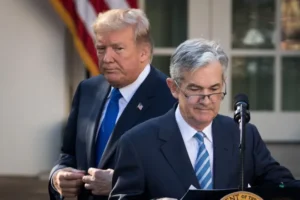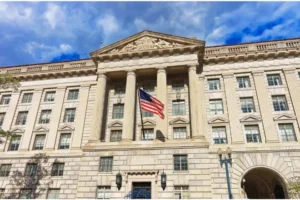The ambitious economic blueprint laid out by President Donald Trump, heavily reliant on the strategic deployment of tariffs, has been thrown into disarray following a recent federal court ruling. This decision, challenging the administration's authority to impose certain sweeping tariffs, could have profound implications for the future of Trump's economic policies and the stability of global trade.
Trump's Tariff-Centric Economic Strategy Faces Legal Setback
President Trump's economic strategy has been consistently characterized by his aggressive use of tariffs. While these tariffs have been a cornerstone, the administration has often described its broader economic agenda as a "three-legged stool," supported by tariffs, spending cuts, and tax cuts. The fundamental idea is that all three components must remain strong for the entire structure to stand. However, a three-judge panel at the U.S. Court of International Trade has dealt a significant blow to this foundation, blocking some of Trump's most significant global tariffs – those citing emergency economic powers. This includes the controversial "Liberation Day" reciprocal tariffs, 10% universal trade policy, and tariffs specifically targeting fentanyl.
With this crucial leg of the economic stool now potentially removed, the future of Trump's comprehensive economic policy plan, heavily dependent on the power of trade policy, hangs in the balance. The administration's argument has consistently been that these tariffs are a powerful negotiating tool. Indeed, historic trade actions have, in many instances, compelled numerous U.S. trading partners to engage in new deals with the Trump administration. In theory, these trade agreements, spurred by the pressure of import duties, were meant to open up foreign markets to a greater volume of U.S. goods, ultimately benefiting American manufacturers and farmers.

Furthermore, a significant part of the Trump administration's fiscal strategy involved revenue generated from these tariffs. This revenue, it was argued, could at least partially offset the substantial cost of the Trump and congressional Republicans' expansive tax cuts. These tax cuts, intended to boost economic growth and provide market certainty by raising the debt ceiling, were seen as intrinsically linked to the financial backing provided by trade policy. Complementary efforts, such as deregulation and spending cuts, particularly through the Department of Government Efficiency (DOGE), were also envisioned to reduce government costs and mitigate the impact of tax cuts on the burgeoning federal debt.
However, the fragile construction of Trump's plan to usher in a new economic Golden Age has always faced considerable skepticism. Many mainstream economists have voiced concerns, arguing that the administration often lacks the discipline, legal authority, and political support necessary to execute such a grand vision. The "on-again, off-again" nature of trade policy, ongoing legal battles concerning DOGE, and intra-party standoffs over the "Big, Beautiful Bill" serve as persistent evidence of these underlying fragilities.
Even prominent financial backers have voiced criticisms. Elon Musk, a key supporter and the public face of Trump’s DOGE team, recently criticized the "Big, Beautiful Bill," contending that its massive additions to America's debt effectively undermined the cost-cutting efforts of the DOGE group. Now, with the potential absence of the tariff component, Republican deficit hawks in Congress may be even less inclined to support Trump's tax cuts. Many were already deeply concerned by the bill’s nearly $4 trillion price tag, even with unpopular cuts to Medicaid.

Aniket Shah, head of sustainability and transition strategy at Jefferies, highlighted the financial implications, noting in a Wednesday client memo that "Increased revenues from tariffs (approximately $150 billion per year) could have helped offset some of the deficit from the reconciliation package." With the legal outcome now uncertain regarding the future of these tariffs, Shah suggests that Trump and Republicans may be compelled to accept reduced tax cuts or implement more aggressive spending cuts to successfully advance the House-approved bill through the reconciliation process with the Senate. The role of tariffs in balancing the budget is now seriously questioned.
More Uncertainty Surrounding Tariffs and Trade
The immediate aftermath of the court ruling presents more questions than definitive answers. The Trump administration has already appealed the decision, a move that could potentially lead to its overturning. "It does raise questions about how the administration will respond and how this affects, if at all, the tax package going through Congress," observed Keith Lerner, co-chief investment officer at Truist Advisory Services.

Even as the appeal progresses through the legal system – potentially all the way to the Supreme Court – Wednesday’s ruling could undermine Trump’s highly sought-after trade deals with foreign partners, which were often achieved under the threat of imposing or expanding tariffs. These deals have been sparsely announced, even with just over a month remaining in the three-month pause of Trump’s "reciprocal tariffs." To date, the administration has only announced framework agreements with the UK and China.
"We believe one reason bilateral negotiations had stalled was that US trading partners may have anticipated this outcome," Shah commented. "Will they now view trade negotiations as a matter to be resolved by the courts, or will they re-engage with the US on trade policy?" The efficacy of using tariffs as a negotiation lever is now in doubt.
While the setback for Trump’s agenda may be temporary, the court’s ruling provides little certainty for businesses, particularly given the administration’s appeal. "If anything, the ruling supercharges the uncertainty already facing businesses and consumers, because it’s the first hint of a possibility that … tariffs could be eliminated entirely," said Ernie Tedeschi of the Yale Budget Lab. "But even if they were, the Administration could try to raise tariffs using other authorities. The potential outcomes just got much more uncertain in both directions — lower or higher tariffs."
The administration may, in fact, have alternative pathways to imposing its desired tariffs and circumventing further legal scrutiny. This could include utilizing Section 232 of the Trade Expansion Act, an authority that was unaffected by the recent court ruling. Indeed, Trump has already levied 25% tariffs on steel, aluminum, autos, and auto parts using this very Section 232 authority. "It’s not over," affirmed Gary Clyde Hufbauer, a nonresident senior fellow at the Peterson Institute for International Economics. "You give a kind of Whac-a-Mole flavor to this whole story," suggesting that the administration will continue to find ways to impose tariffs.
Conclusion: The Future of Trump's Economic Agenda
The recent court ruling represents a significant challenge to President Trump's core economic philosophy and his heavy reliance on tariffs. While the administration is appealing the decision and may seek alternative avenues to implement its trade policies, the immediate impact is a heightened sense of uncertainty for businesses, investors, and international trading partners. The intricate balance of Trump's economic "three-legged stool" has been disturbed, and how the administration navigates this legal and political landscape will undoubtedly shape the future of U.S. trade and economic policy.
See more information here:
- G7 Statement Forex Impact: USD Gains While JPY Rallies on Safe-Haven Flows
- Markets Push Back Fed Rate Cuts – Stocks and US Dollar at RiskG7 Statement Forex Impact: USD Gains While JPY Rallies on Safe-Haven Flows
- Trump Delays EU Tariffs to July 9 – EUR/USD Breaks Higher as Market Reacts Like a G7 Shock
For those navigating these complex economic shifts, understanding the underlying dynamics and potential outcomes is crucial. H2T Finance specializes in providing expert financial analysis and strategic guidance, helping businesses and individuals make informed decisions amidst evolving global economic conditions. Stay tuned for further developments on this Breaking news.
About H2T Finance
H2T Finance’s Breaking News delivers real-time financial news, keeping you up to date with market movements, policies, and global economic events. As part of H2T Media Group, we are committed to providing accurate information and in-depth analysis, helping investors make quick, confident decisions in an ever-changing financial landscape.
For inquiries or personalized assistance, feel free to contact us:
📞 Phone: +84933.948.888
📧 Email: info@h2tmediagroup.com
💻 Website: https://h2tfinance.com/
📍 Address: 4/567 Tổ 10 Khu Phố Hòa Lân 1, Thuận An, Bình Dương, Vietnam
At H2T Finance, your success is our priority.


